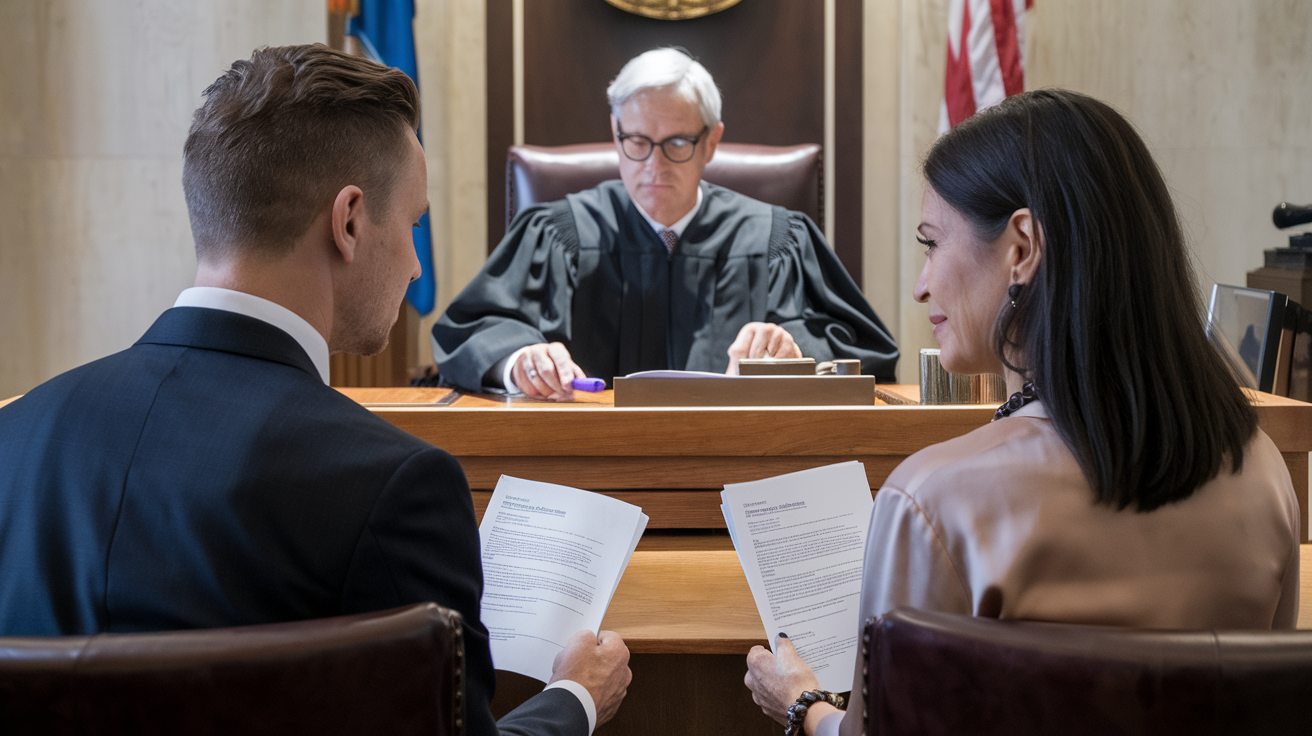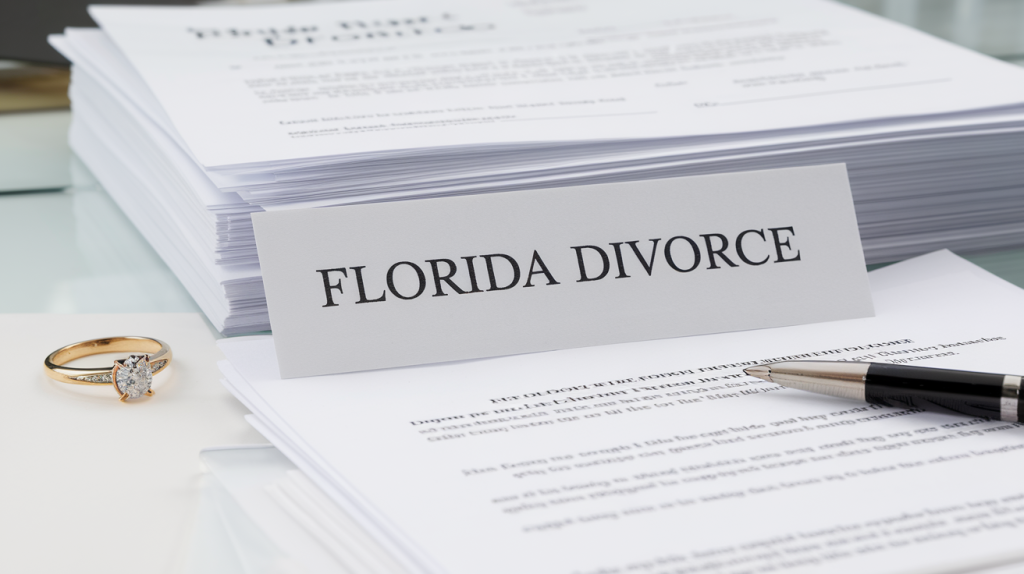Want to know how Florida handles property division during a divorce?
Many couples believe Florida splits everything down the middle since it’s labeled a “50/50 state.” But the truth isn’t that simple.
Florida courts look at multiple factors when deciding who gets what in a divorce – from the length of the marriage to each person’s financial situation.
This blog explains what Florida law says about dividing assets and debts in a divorce.
You’ll learn the key factors judges consider, the different types of property that get divided, and what steps you can take to prepare for property division.
Is Florida a 50/50 Divorce State – Myth vs Fact

Many believe Florida is a 50/50 divorce state, but that’s not entirely true.
While courts aim for fairness, assets and debts are divided based on equitable distribution, not an automatic equal split.
- Equal Split of All Assets: Many believe courts split each item down the middle. Actually, some assets stay whole while others get balanced through different means – like one spouse keeping the house while the other receives retirement funds.
- Everything Gets Divided: Not all property faces division in a divorce. Personal gifts, inherited items, and assets owned before marriage usually stay with their original owner.
- Bank Accounts are Split in Half: Joint accounts don’t automatically split 50/50. Courts examine each person’s spending patterns, contributions, and future needs before deciding the distribution.
- Both Parties Share All Debts: Credit cards and loans in one person’s name might not become shared responsibilities. The court examines when the debt started and how it benefited the marriage.
- Business Value Division: Business owners often worry about selling or splitting their company. Courts typically find ways to compensate the other spouse without breaking up the business operations.
- Retirement Funds Division: Many believe pension and retirement accounts automatically split equally. The portion earned during marriage faces division, while pre-marriage savings often remain separate.
- House Always Gets Sold: Courts don’t always force a home sale. Sometimes, one spouse can buy out the other’s share or trade other assets to keep the property.
- Same Rules Apply to Everyone: Each divorce case receives individual consideration. Income differences, health issues, and child custody create unique settlement terms.
Equitable Distribution Concept in Florida
Florida uses equitable distribution to split property during divorce.
But what does “equitable” mean in real life? While some states, like California, split everything 50/50 as community property, Florida takes a different path. Here, equitable means “fair” rather than “equal.”
Each divorce case is unique, and the final split depends on circumstances. Sometimes, a 60/40 or 70/30 division might be considered more fair than a straight 50/50 split.
Equal Distribution Vs. 50-50 Split
Florida courts focus on fairness, not just an equal split. The goal is to divide assets and debts in a way that considers each spouse’s contributions and future needs.
| Detail | Information |
|---|---|
| Dividing Assets in Florida Divorce | Florida follows equitable distribution, meaning assets and debts are divided fairly, not always 50-50. Courts look at each spouse’s situation to decide what’s fair. |
| Equal vs. 50-50 Split | Many assume everything is split evenly, but that’s not always the case. Instead of a strict half-and-half split, courts consider various factors to ensure a fair outcome. |
| Factors Courts Consider |
|
| When a 50-50 Split Happens | Courts may divide assets equally if both spouses have similar earnings and shared responsibilities and no major factors favor one side over the other. |
| When an Unequal Split Happens | If one spouse earns significantly more, made career sacrifices, or has a greater need for financial support, the court may award a larger share to that person. |
| Debt Division | Just like assets, debts are divided fairly. If one spouse took on more debt for family needs, they might get a smaller share of assets to balance it out. |
| What Happens to the Family Home? | The court looks at factors like who has primary custody of the children, the financial ability to maintain the home, and whether selling it is a better option. |
| Retirement Accounts and Benefits | Pensions, 401(k)s, and other retirement savings are divided fairly, with each spouse’s future financial security considered. |
| Business Ownership | If one spouse owns a business, the court may consider how much the other spouse contributed, either financially or through indirect support. |
Florida’s Divorce Laws and Property Division

Before dividing anything, Florida courts first sort assets and debts into marital and non-marital property.
Marital Property Includes:
- Assets bought during the marriage
- Income earned while married
- Retirement benefits accumulated during marriage
- Gifts between spouses
- Houses or cars purchased together
Non-Marital Property Covers:
- Items owned before marriage
- Inheritance received by just one spouse
- Personal gifts from others to one spouse
- Property listed as separate in a valid prenuptial agreement
Sometimes, property can mix or “commingle” – like when someone uses their pre-marriage savings to buy a house with their spouse.
In these cases, the court carefully traces where the money came from to decide if it’s marital or non-marital property.
When property gets divided, timing matters. The court typically uses the date of filing for divorce as the cutoff point. This means that after filing, new debts or assets usually stay with the person who acquired them.
Each case gets reviewed based on its specific details – there’s no one-size-fits-all solution in Florida divorce law.
Factors Influencing Property Division in Florida

The courts in Florida consider several important factors when deciding how to split property.
Here’s what affects the final decision.
1. Marriage Duration
The length of your marriage plays a big role. For marriages lasting over 7 years, courts tend to look more closely at equal division.
In shorter marriages, they might focus more on returning each person to their financial state before marriage.
2. Financial Status
Each person’s money situation matters greatly. Courts examine how much a person earns and spends, as well as their job skills and education. Future earning potential and any health issues that could affect work play a big role.
Retirement plans and benefits also come into the picture. It’s all about getting a clear picture of a person’s ability to support themselves now and in the future.
3. Contributions to Marriage
Courts value both financial and non-financial help to the marriage. Earning income matters, but so does raising kids, keeping the house running, and supporting a spouse’s career.
Managing family finances, making sacrifices, and handling daily responsibilities all count. Whether through a paycheck or behind-the-scenes effort, every contribution helps build the life shared d
4. Child-Related Responsibilities
When kids are in the picture, courts focus on what’s best for them. They look at who has primary custody, where the children go to school, and whether staying in the family home is possible.
Future costs, like education and daily needs, also come into play. If a child has special needs or medical expenses, that’s given extra attention to make sure they get the care they need.
5. Career Sacrifices
Courts pay close attention when one spouse puts their career or education on hold for the marriage. Delaying school, missing promotions, cutting work hours to care for family, or relocating for a spouse’s job all matter.
Time spent supporting a spouse’s career growth, whether through sacrifices or behind-the-scenes effort, is also considered. These choices can have a lasting impact, and courts take that into account.
6. Asset Management
How each person handled money during marriage counts. How money was managed during the marriage plays a big role in court decisions. Saving habits, spending choices, and investment decisions all matter.
Handling debt responsibly, keeping up with property maintenance, and planning for the future are also considered. Whether someone is careful with finances or reckless with money can make a difference in the outcome.
7. Economic Changes
Recent financial changes can affect division. Money situations can change fast, and courts take that into account. Losing a job, dealing with medical issues, or shifts in the market value of assets can all impact finances.
A business may have done well or struggled, and any inheritance or gifts received also come into play. These changes can make a big difference in how everything gets divided.
How to Protect Your Interests in a Florida Divorce

Going through a divorce in Florida can be complicated, especially when dividing assets and debts. However, understanding legal rights, financial factors, and key decisions can help protect long-term interests.
- Document All Assets: Make copies of tax returns, bank statements, and investment records early before starting divorce proceedings. Creating a complete financial picture helps ensure nothing gets overlooked during property division.
- Keep Records of Non-Marital Property: Save proof of assets owned before marriage or received through inheritance. Maintaining clear documentation prevents these items from entering the shared property pool.
- Monitor Joint Accounts: Watch shared credit cards and bank accounts for unusual spending. Setting up transaction alerts helps catch potential financial issues before they grow larger.
- Gather Professional Valuations: Get expert appraisals for valuable items like homes, businesses, or collections. Professional assessments provide solid evidence for fair market worth during negotiations.
- Create Asset Lists: Make detailed inventories of household items, including photos and purchase receipts. This documentation becomes valuable when determining the distribution of personal property.
- Seek Financial Guidance: Understand long-term implications with tax experts and financial planners. Professional advice helps make informed decisions about property settlement options.
- Check Credit Reports: Review credit histories and address joint debts promptly. Regular monitoring prevents surprise financial obligations from appearing during proceedings.
- Save Communication Records: Store emails, texts, and documents about financial agreements or property discussions. Written records provide clear evidence if disagreements arise later.
Conclusion
Understanding Florida’s divorce laws makes a big difference when facing property division. While many call Florida a 50/50 state, the reality shows courts focus on fair distribution rather than equal splits.
Every marriage brings unique circumstances – from career choices to child-raising decisions – which shape how assets get divided.
Remember, protecting your interests starts with good preparation. Gathering documents, tracking assets, and seeking professional help early in the process leads to better outcomes.
The courts aim to create fair solutions for both parties, even if that means moving away from a straight half-and-half division.
Frequently Asked Questions
Is My Wife Entitled to Half My House if it’s in My Name?
If you bought the house during marriage using marital funds, your wife may have rights to it regardless of whose name is on the deed. The timing of purchase and source of funds matters most.
Does a Husband Have to Support His Wife During Separation?
Yes, courts can order temporary support during separation based on both spouse’s financial needs and ability to pay until the divorce is final.
What is the 7-Year Divorce Rule in Florida?
Florida uses 7 years as a benchmark for long-term marriages. This affects how courts view alimony and property division, often favoring more equal marriage splits over 7 years.








